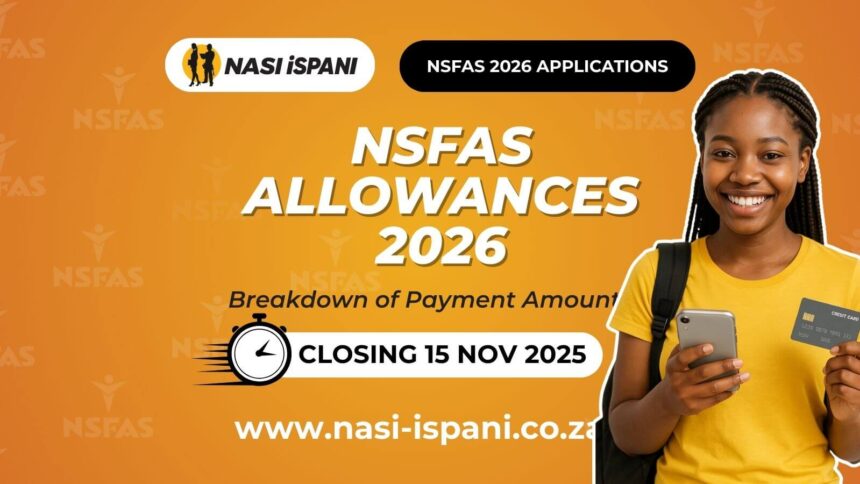The National Student Financial Aid Scheme (NSFAS) continues to play a pivotal role in helping South African students access higher education. By covering tuition and providing key allowances, NSFAS reduces the financial strain on students from low-income households.
- Estimated NSFAS Allowances 2026
- 1. Tuition Fees
- 2. Accommodation Allowance
- 3. Living Allowance
- 4. Transport Allowance
- 5. Learning Material Allowance
- 6. Disability Allowance
- Estimated Breakdown of NSFAS Allowances 2026
- How to Qualify for NSFAS Allowances 2026
- Payment Process for NSFAS Allowances 2025
- Frequently Asked Questions
This guide breaks down the NSFAS Allowances 2026, giving university and TVET college students a clear picture of what to expect.
Estimated NSFAS Allowances 2026
This article offers a detailed breakdown of NSFAS Allowances 2025, giving students a clear understanding of what to expect.
1. Tuition Fees
One of the biggest benefits of NSFAS funding is full tuition coverage for qualifying students.
- Universities: Full tuition for approved undergraduate programmes.
- TVET Colleges: Full tuition for accredited vocational and technical courses.
By funding tuition under NSFAS Allowances 2026, the scheme ensures that no eligible student is excluded from higher education due to financial barriers.
2. Accommodation Allowance
Accommodation is one of the largest expenses for students who move away from home. NSFAS offers support for students in accredited housing.
Estimated Allowance for 2026:
- Universities: Up to R45,000 per year
- TVET Colleges: Up to R33,000 per year
Note: All accommodation must be NSFAS-accredited to qualify.
Learn more: NSFAS Student Portal Not Working? Here’s How to Fix Login Problems
3. Living Allowance
The living allowance is a vital part of NSFAS Allowances 2026, designed to support students with their day-to-day expenses, including food, toiletries, and other personal necessities.
Living Allowance for 2026:
- University and TVET College Students: R1,650 per month
This monthly allowance ensures that students can focus on their studies without worrying about basic living costs.
4. Transport Allowance
Students who commute to and from campus can rely on the transport allowance provided under NSFAS Allowances 2026. This financial support covers travel costs for non-residential students living within 40 kilometers of their institution.
Transport Allowance for 2026:
- All Students: Up to R7,500 per year
This allowance ensures that transportation expenses do not become a barrier to attending classes regularly.
5. Learning Material Allowance
In 2026, students will continue to benefit from a learning material allowance under NSFAS Allowances 2026. This funding enables students to purchase textbooks, stationery, and other educational resources essential for their studies.
Learning Material Allowance for 2026:
- All Students: R5,200 per year
This amount can also be used to purchase digital devices such as laptops, which are becoming increasingly necessary for academic success.
6. Disability Allowance
NSFAS remains inclusive by providing additional financial support for students with disabilities. The disability allowance, part of NSFAS Allowances 2026, is tailored to meet specific needs, including assistive devices and personal assistance.
Disability Allowance for 2026:
- Assistive Devices: Costs depend on the device required.
- Specialized Services: Funding is provided based on individual needs.
Students must complete the Disability Annexure Form to access this component of NSFAS funding.
Estimated Breakdown of NSFAS Allowances 2026
Below is a summary of the estimated amounts for NSFAS Allowances 2026:
| Allowance Type | University Students | TVET College Students |
|---|---|---|
| Tuition Fees | Full coverage | Full coverage |
| Accommodation | Up to R45,000/year | Up to R33,000/year |
| Living Allowance | R1,650/month | R1,650/month |
| Transport Allowance | Up to R7,500/year | Up to R7,500/year |
| Learning Material Allowance | R5,200/year | R5,200/year |
| Disability Allowance | Varies by need | Varies by need |
These amounts ensure that students receive adequate financial support throughout their academic journey.
How to Qualify for NSFAS Allowances 2026
To access NSFAS Allowances 2026, students must meet the following criteria:
- Household Income: Your combined household income must not exceed R350,000 per year.
- Institutional Enrollment: You must be enrolled in a public university or TVET college.
- Academic Progress: You must maintain satisfactory academic performance as defined by NSFAS.
Applications for 2025 are submitted online via the NSFAS portal: my.nsfas.org.za.
Payment Process for NSFAS Allowances 2025
NSFAS ensures seamless disbursement of allowances to students. Payments are made directly into students’ NSFAS-linked bank accounts.
How Allowances Are Paid:
- Monthly Payments: Living and transport allowances are distributed monthly.
- Annual Payments: Learning material and some disability allowances are paid as lump sums at the beginning of the academic year.
Frequently Asked Questions
1. Are NSFAS allowances sufficient for all expenses?
While NSFAS Allowances 2025 cover many essential costs, students may need to budget carefully and explore additional sources of income for non-covered expenses.
2. Can I receive a laptop through NSFAS?
Yes, students can use their learning material allowance to purchase laptops or other essential digital tools.
3. Will NSFAS fund my postgraduate studies?
NSFAS primarily funds undergraduate studies, with exceptions for specific postgraduate qualifications like teaching and nursing diplomas.
The NSFAS Allowances 2025 provide comprehensive financial support to ensure that students can focus on their education without the burden of financial stress. By covering tuition fees, accommodation, living expenses, and more, NSFAS continues to make higher education accessible to all.
If you’re planning to study in 2025, take advantage of these allowances and secure your funding by applying on time. For more information, visit the official NSFAS website: www.nsfas.org.za.



